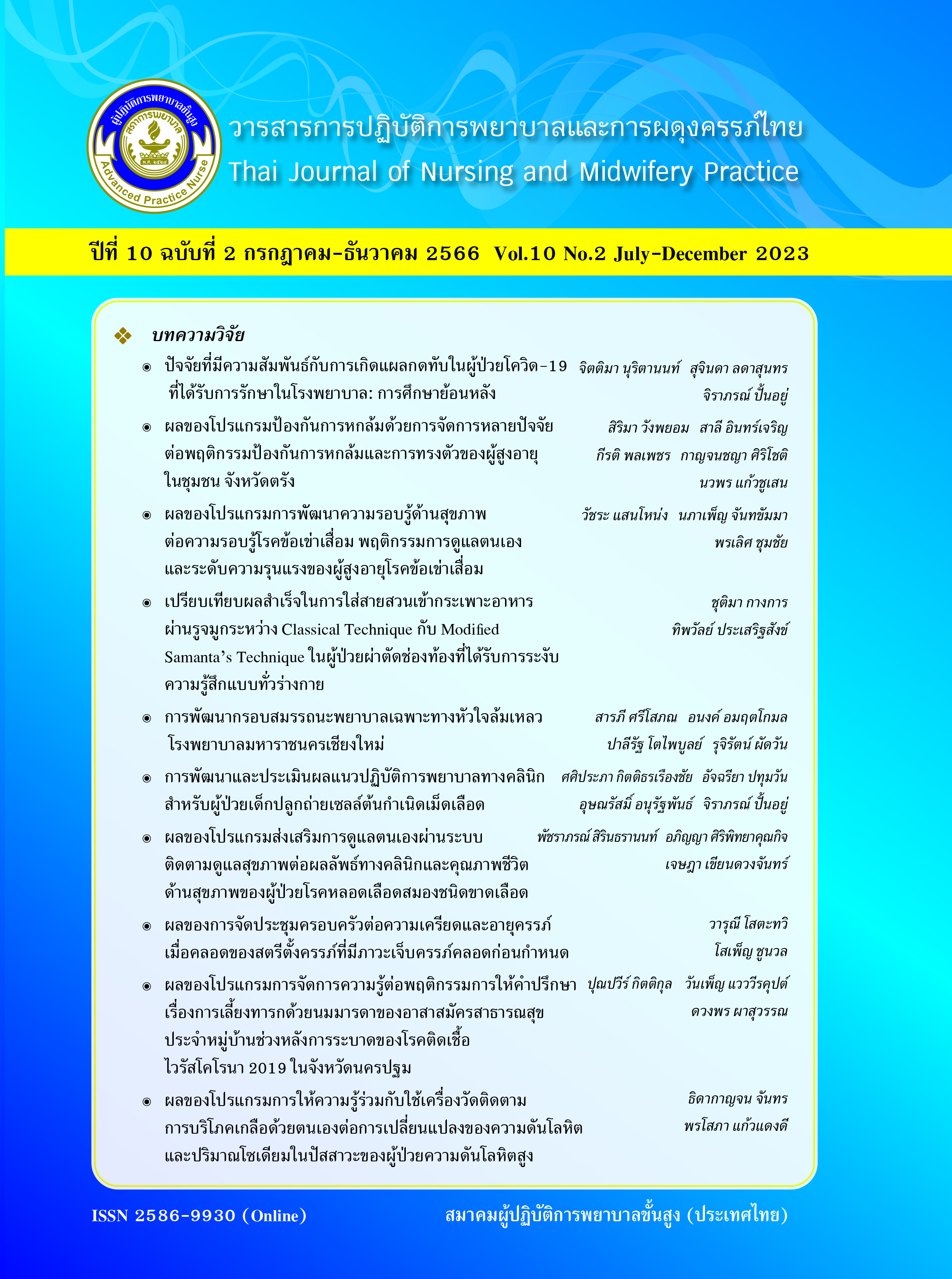Effects of Self-Care Promoting Program via mHealth on Clinical Outcomes and Health-Related Quality of Life in Ischemic Stroke Patients
Main Article Content
Abstract
Abstract: This quasi-experimental research aimed to study the effects of stroke self-care promoting program via mHealth on clinical outcomes and health-related quality of life in ischemic stroke patients. Orem’s self-care theory was used as a conceptual framework for the study. The sample consisted of patients newly diagnosed with ischemic stroke receiving treatment in the ward of a university-affiliated hospital. They were divided into control and experimental groups, with 25 persons in each group. The control group received the usual nursing care. The experimental group received the stroke self-care promotion program via mHealth for 10 weeks. Data were collected using demographic records, health information data, the National Institutes of Health Stroke Scale (NIHSS), and Stroke Impact Scale 3.0. Data were analyzed using inferential statistics: Chi-square test, Friedman test, paired t-test, and analysis of covariance. Results showed that after two weeks of program completion, the experimental group had significantly reached the target systolic blood pressure, had better severity of disease, and had better health-related quality of life than that of the usual care group. The mean lipid levels were slightly decreased, but there was no statistically significant difference between the two groups. The self-care promoting program could help to reduce the severity of disease and improve health-related quality of life. The longtudinal study should be conducted in order to achieve changes in other clinical outcomes, addressing more intensive emotional support, and reducing other stroke risk factors.
Downloads
Article Details

This work is licensed under a Creative Commons Attribution-NonCommercial-NoDerivatives 4.0 International License.
References
World Health Organization. World health statistics overview 2019: Monitoring health for the SDGs. Geneva: World Health Organization; 2019.
Tiamkao S. Prevalence of cerebrovascular disease in Thailand. Thai Journal of Neurology 2022; 39(2):39-46. (In Thai)
Hospital Information System Ramathibodi Hospital. Statistics of inpatients for the year 2021. Bangkok: Faculty of Medicine Ramathibodi Hospital; 2021. (In Thai)
Kitisomprayoonkul W. Stroke rehabilitation medicine. Bangkok: Danex Inter Corporation; 2015. (In Thai)
Nova Scotia Health. Patient & family guide 2023: Recovery after a mild stroke. [updated May 2023]. Available from: https://www.nshealth.ca/sites/default/files/documents/pamphlets/1455.pdf
National Institute of Neurological Disorders and Stroke. Stroke. [updated 12 June 2023] Available from: https://www.ninds.nih.gov/health-information/disorders/stroke
Wilson N. Jones Regional Medical Center. How long does a mild stroke recovery take? lifestyle changes after a transient ischemic attack. [updated 7 September 2023] Available from: https://wnj.org/how-long-does-a-mild-stroke-recovery-takelifestyle-changes-after-a-transient-ischemicattack.
Devereux N, Berns AM. Evaluation & treatment of psychological effects of stroke. Dela J Public Health. 2023;9(3):62-9. doi:10.32481/djph.2023.08.011
Shu-Chin Y, Suh-Ing H, Jiann-Der L, Tsui-Ping C, Jun-Yu F. Physical function, depressive symptoms, and quality of life with post-acute stroke care. Collegian. 2023; 30(3): 475-82. doi: 10.1016/j.colegn.2023.01.001.
Kleindorfer DO, Towfighi A, Chaturvedi S, Cockroft KM, Gutierrez J, Lombardi-Hill D, et al. 2021 Guideline for the prevention of stroke in patients with stroke and transient ischemic attack: a guideline from the American Heart Association/American Stroke
Association. Stroke 2021; 52(7): e364-e467. doi:10.1161/STR 0000000000000375.
Tsao CW, Aday AW, Almarzooq ZI, Anderson CAM, Arora P, Avery CL, et al. Heart disease and stroke statistics-2023 update: A report from the American Heart Association. Circulation. 2023; 147(8):e93- 621. doi: 10.1161/CIR.0000000000001123.
Moomthee W, Monkong S, Sirapo-ngam Y, Leelacharas S. Impact of transitional care programme and family caregivers on stroke patients’ routine activity performance, complications, and satisfaction. JTMNC. 2016; 31(1): 95-110. (In Thai)
Paksee N, Sirapo-ngam Y, Monkong S, Leelacharas S. Effects of a transitional care program for stroke patients and family caregivers on caregiver’s preparedness, stress, adaptation, and satisfaction. Rama Nurse J. 2016: 22(1): 65-79. (In Thai)
Thongbupa S, Muengtaweepongsa S, Kommarg U. Effectsof a self-management program among patients with ischemic stroke. Nursing Journal CMU. 2022; 49(3): 174-87. (In Thai)
Qin P, Cai C, Chen X, Wei X. Effect of home-based interventions on basic activities of daily living for patients who had a stroke: a systematic review with meta-analysis. BMJ Open. 2022; 12(7): e056045. doi: 10.1136/bmjopen-2021-056045. PMID: 35902187; PMCID: PMC9341195.
Lin, B, Zhang, Z, Guo, Y, et al. Perceptions of recurrence risk and behavioural changes among firstever and recurrent stroke survivors: A qualitative analysis. Health Expect. 2021; 24: 1962-70. doi: 10.1111/hex.13335
Sindhu S, Adunwatanasiri P, Utriyaprasit K, Konggumnerd K, Kochasawas W. Policy options to develop model of primary care services for caring patients with stroke: Bangkok Metropolitan Administration; 2020. (In Thai)
Orem DE, Taylor SG, Renpenning KM. Nursing: Concepts of practice (6th ed.). St. Louis: Mosby; 2001.
Hailu, AD, Ahmed S, Yimer Y. Health-related quality of life of stroke patients before and after intervention: Systematic review. JBM. 2020; 4(1):22-8. doi: 10.17352/jbm.000023.
Ruangdej W, Amnatsatsue K, Kerdmongkol P. Effects of a case management program on quality of life and functional status of dependent older adults post stroke in Bangkok. J Pub Health Nurse. 2020;34(1): 112-26. (In Thai)
Brooke P, Bullock R. Validation of a 6 items cognitive impairment test with a view to primary care usage. Int J Geriatr Psychiatry. 1999; 14(11):936-40.
Aree-Ue S, Youngcharoen P. The 6 Item Cognitive Function Test-Thai version: psychometric property testing. Rama Nurse J. 2020: 26(2): 188-202. (In Thai)
Nilanont Y, Phattharayuttawat S, Chiewit P, Chotikanuchit S, Limsriwilai J, Chalernpong L, et al. Establishment of the Thai Version of National Institute of Health Stroke Scale (NIHSS) and a validation study. J Med Assoc Thai. 2010; 93(1):S171-8.
Duncan PW, Bode RK, Min Lai S, Perera S. Rasch analysis of a new stroke-specific outcome scale: The stroke impact scale. Arch Phys Med Rehabil. 2003;84(7): 950-63.
Masana L, Ibarretxe D, Plana N. Maximum lowdensity lipoprotein cholesterol lowering capacity achievable with drug combinations: when 50 plus 20 equals 60. Rev Esp Cardiol. 2016; 63(3):337-49. doi: 10.1016/j.rec.2015.11.008.


